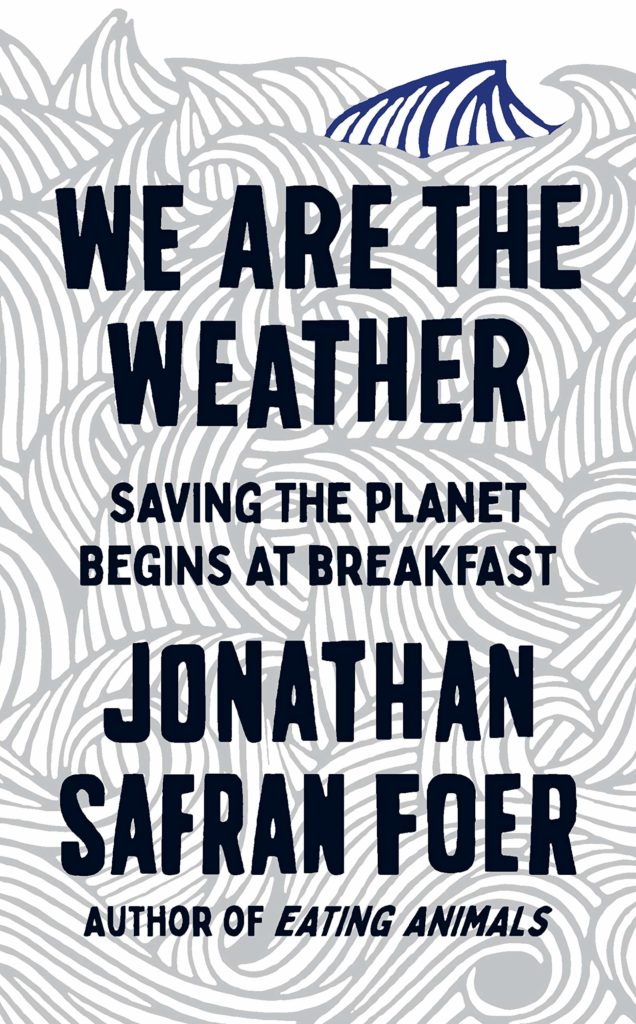
Most of our minds are occupied with the thought of how to help save the environment and stop our home planet from warming up even more. The most asked question here is, how can we do it; what can we as individuals do to help?
The book, “We are the Weather” by Jonathan Safran Foer tries to answer this question, but it simultaneously does so much more. The non-fiction book talks about generational responsibility, the author’s family history, his failures, and how he wrestles with his conscience, as well as daily actions we, as individuals, can do. Before reading this, I felt a bit helpless, that even though I’m trying to be more eco-conscious, it just wasn’t enough. But this book convinced me to keep trying and that’s why I really needed to share my thoughts on it with you!
Changing how we eat will not be enough, on its own, to save the planet, but we cannot save the planet without changing how we eat.
Jonathan Safran Foer
The first part of the book does not give you the impression of reading a book about climate change, which is why you get stuck to it, why you keep on reading and not wanting to let go. Jonathan Foer takes small stories from all over the world and compares them to how our generation must react to climate change. One of the stories that is woven throughout the book, is the story about his dying grandmother. She was a Jew, growing up in Poland and had to flee her small village because of the Nazis. She was the only person in the village, who realized and believed that the Nazis were coming and escaping was her best option. And this is the important part, she BELIEVED they were coming, so she fled. Foer argues that this act of believing is so much more than knowing. Knowing does not drive you to act, but believing does.
The problem nowadays is that most people know that climate change is happening, but only a few really believe in it. That’s why nothing is happening, why people still choose comfort over facts, why they still eat meat, why they still choose to fly and not recycle. All of this is just more convenient for them and as long as they do not believe in climate change, they will not change their lifestyle. In his book, Foer admits that he himself is part of the people who know but don’t believe. He himself struggles coming to terms with all of it and even though he wrote a whole book about why we should not eat meat (Eating Animals), he still does. He does it in his most desperate times, whenever he’s sad and depressed and does not know what to do.
It feels obvious to me that I am not a climate change denier, but it is undeniable that I behave like one.
Jonathan Safran Foer
This is honestly what sold the book to me. That he admits not being perfect, that he does not even follow his own advice. It makes him seem more flawed and makes me a little bit more hopeful. I often find books about climate change are extremely hard to read, because they make you feel like you are only making mistakes. They point out every little detail in your life that is not eco-friendly, that is not sustainable and to most people, including me, this is so demotivating. But Foer makes me feel hope. Even if his book is mostly about how he slips up and how he is not even hopeful himself. It just makes me feel like it’s ok if you make mistakes from time to time, you just have to keep trying and taking it one decision at the time.
When a radical change is needed, many argue that it is impossible for individual actions to incite it, so it’s futile for anyone to try. This is exactly the opposite of the truth: the impotence of individual action is a reason for everyone to try.
Jonathan Safran Foer
For everyone who has lost their hope and maybe feels a bit judged and like they are not doing enough or that because they are not perfect, do not need to try: Read this book! It is amazing and it takes so much more into account than I could ever describe and it’s so much more than what I have explained.


Just added this to my summer reading list! Insightful perspective Nicki!